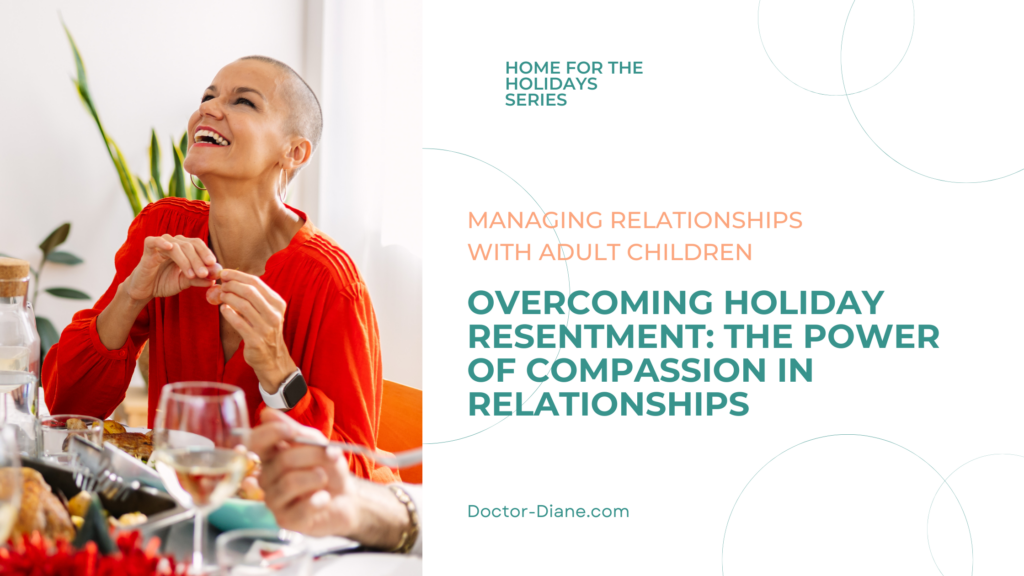Overcoming Holiday Resentment: The Power of Compassion in Relationships
By Dr. Diane Strachowski, Licensed Psychologist, Relationship Expert, and Attachment Style Aficionado
The holidays—what a magical time of year, right? Twinkling lights, carefully wrapped gifts, perfect meals, and… oh wait, you’re the one behind all of it, aren’t you? While everyone else basks in the glow of holiday cheer, you’re running yourself ragged trying to create the perfect experience. The endless shopping, wrapping, cleaning, hosting, planning—it’s exhausting. And as the to-do list grows, so does a tiny seed of resentment.
You love your family, but sometimes, it feels like it all falls on your shoulders. And when you feel like you’re doing it all alone, it’s easy for that holiday spirit to curdle into something a lot less festive: bitterness.
The Real Root of Holiday Fights
Contrary to popular belief, most couples don’t fight over money, sex, or even in-laws during the holidays. Sure, those things can add to the stress, but what really stokes the flames of conflict is something deeper: the impression that our partners don’t care how we feel.
When you’re feeling overwhelmed and your spouse doesn’t seem to notice—or worse, doesn’t seem to care—it can feel like a violation of your very being. And in relationships, this lack of compassion is where resentment takes root.
Once resentment sets in, it’s like lighting a slow-burning fuse. If left unchecked, it turns into something even more toxic: contempt.
From Resentment to Contempt: A Dangerous Shift
When compassion decreases, resentment increases. As resentment grows, it often morphs into contempt—the feeling that your partner’s hurt no longer evokes sympathy but irritation.
Think about the last time you felt resentful during the holidays. Maybe you were up late wrapping gifts while your partner sat on the couch watching TV. You might have thought, “They don’t care about how much I’m doing.” Over time, that resentment can transform into something worse: a belief that your partner is lazy, ungrateful, or uncaring. You start to see them as morally inferior, mentally checked out, or just plain selfish. Contempt not only erodes your compassion but also damages the very foundation of your relationship.
Without compassion, we justify judging our partners harshly, sometimes seeing them as ignorant, unworthy, or undeserving of our empathy. And that’s when a holiday squabble over who should be buying the turkey turns into a deeper fracture in the relationship.
The Power of Compassion: A Path Out of Resentment
The antidote to resentment is compassion. Not just compassion for your partner, but for yourself.
Compassion isn’t about trying to change your partner or making them see the error of their ways. It’s about restoring your own humanity by increasing your capacity to empathize. When you extend compassion, you automatically reduce resentment.
How does this work during the holidays, when stress levels are high and patience is low? It starts with acknowledging that you are not alone. Even if it feels like everything is on your shoulders, taking a step back and inviting your partner into the process—not with anger or bitterness but with vulnerability—can make a huge difference.
Communication Is Key: Breaking the Cycle of Resentment
The first step to breaking the cycle of resentment is clear, compassionate communication. Instead of letting your frustration build to the point where you explode (or retreat into icy silence), express your feelings calmly and openly.
Here are some tips for communicating when you’re feeling overwhelmed by holiday responsibilities:
Start with “I” Statements: Instead of accusing your partner of not helping, focus on how you’re feeling. Try something like, “I’m feeling really stressed about getting everything done for the holidays, and I could use some help.” This shifts the conversation from blame to collaboration.
Acknowledge Their Efforts: Even if your partner isn’t doing exactly what you think needs to be done, acknowledge their contributions. “I appreciate that you’ve been handling the yard work. It’s one less thing for me to worry about.”
Ask for Help, Don’t Demand It: Instead of issuing ultimatums, ask for help in a way that makes it feel like a partnership. “Could we work together to get the house ready for guests? It would mean a lot to me.”
Shifting Responsibilities: Time to Share the Load
If you have adult children, now is the perfect time to shift some of the holiday responsibilities. Maybe you’ve always been the one to host the big holiday meal or handle all the gift shopping, but it’s okay to share the load. In fact, it’s healthy.
Here’s how you can start to spread out the holiday responsibilities:
Set New Traditions: The holidays don’t have to be exactly the way they’ve always been. Maybe instead of cooking the entire meal, you ask each family member to bring a dish. Or, instead of spending days cleaning the house, you hire help or rotate hosting duties with other family members.
Be Honest About Your Limits: It’s easy to feel like you have to do it all, but setting boundaries is key. Let your family know what you’re willing to do—and what you’re not. “I love hosting Christmas, but I need help with the cooking this year. Can you pitch in?”
Involve Your Partner: If you’ve been shouldering most of the holiday responsibilities, involve your partner in the planning process. Maybe they’re great at organizing activities, or they can handle the shopping while you focus on other tasks. The key is to approach the holidays as a team, rather than taking on everything yourself.
New Traditions, New Expectations
Holidays are a great time to create lasting memories, but those memories don’t have to come at the cost of your well-being. If you’ve been feeling overburdened, consider changing up your holiday traditions to make things easier for everyone.
Gift Giving: Instead of buying gifts for every single person in the family, start a Secret Santa or white elephant gift exchange. It reduces shopping stress and adds an element of fun.
Simplify the Meals: You don’t have to cook a five-course feast to make the holidays special. Maybe this year, it’s a potluck, or you order takeout from your favorite local restaurant. What matters is the time spent together, not the complexity of the meal.
Shift the Focus: Rather than focusing on perfection, focus on presence. Spend more time connecting with your family and less time trying to create the “perfect” holiday atmosphere. Let go of unrealistic expectations, and embrace the imperfect joy of the season.
Final Thoughts: Compassion Is the Gift That Keeps on Giving
As you navigate the holiday season, remember that resentment and bitterness don’t have to be part of the equation. Compassion—for yourself and your partner—is the key to reducing holiday stress and keeping your relationship strong.
By communicating openly, sharing responsibilities, and adjusting your holiday expectations, you can create a holiday season that’s not only memorable but also manageable. And as your compassion grows, you’ll find that the joy of the season isn’t in the perfect gift or meal, but in the love and connection you share with your family.
Because at the end of the day, isn’t that what the holidays are all about?



